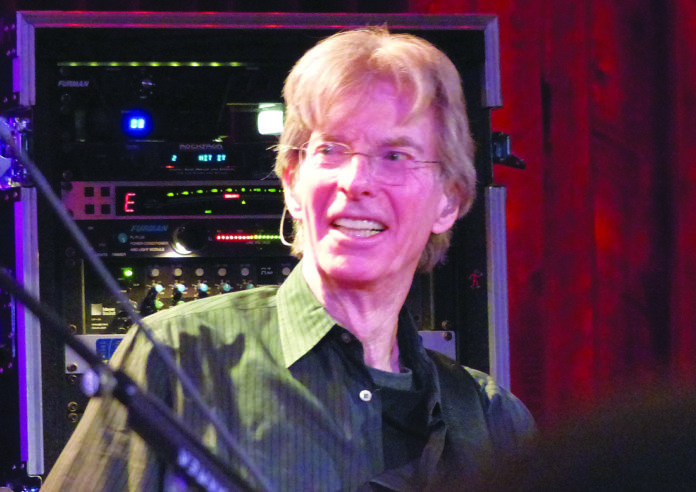In 2010, I was the city librarian of San Rafael, and Phil Lesh and his wife, Jill, were working on starting a new restaurant and nightclub in Fairfax. There was opposition from the locals, who feared excessive crowds and noise from such a venture.
By all reports, Lesh was getting discouraged. So, I sent him an email asking if he might be open to considering San Rafael as a possible location. He replied with enthusiasm, and I connected him with our city economic development director, Nancy Mackle, who then worked with the Leshes to create the dream-come-true that was Terrapin Crossroads.
That is, I believe, one of the highlights of my career as a civil servant. I had left the city’s employ by the time TXR opened in March 2012, but Lesh generously invited me to attend the opening run of shows—a highlight of my career as a Deadhead.
That Deadhead part of my life began in 1976 at a concert at the Oakland Coliseum when the Dead opened for The Who. I was transformed, hooked, and I have spent the bulk of my musical attention and music budget ever since on Grateful Dead music and have had a small role in contributing to the written literature about the band. I even played keyboard in a Grateful Dead tribute band called Dead Again for several years.
And always, running as a constant thread beneath it all, was the bass playing of Phil Lesh.
There was nothing like it. It was not “normal” bass playing. Lesh’s playing was melodic as much as rhythmic, and his playing was a constant musical conversation with whomever he was playing with. Most notably, Jerry Garcia. Bob Weir once described his role in the band as figuring out how to connect Lesh and Garcia’s playing in a constant state of improvisation.
Lesh’s deep background in music theory set him apart from the folkies and rockers he was playing with, and he took the band in new directions while honoring the roots that made them a part of the American musical traditions of folk, country, blues and bluegrass. And he knew how to unleash the occasional booming bass note that would shake the walls of whatever old ice rink or basketball stadium the band was playing: The Phil Bomb.
After Garcia’s death in August 1995, it fell to the band’s surviving members to decide what might be next for the traveling circus enterprise, the Grateful Dead. Fortunately for all of us, the remaining band members formed a succession of bands that carried on as, variously, The Other Ones, The Dead and Furthur. They capped it with a series of shows in 2015 called Fare Thee Well, with concerts in the Bay Area and Chicago. I attended the Chicago shows, saying goodbye to this aggregation of players who had been the soundtrack of my life for nearly 40 years at that point.
But the music never stopped. Lesh kept playing with a cavalcade of musicians who were up for the adventure. His club hosted countless nights of never-before and never-again-heard music. He lit up the room with his fierce, smiling joy at the sounds they were creating together.
Each time he played, he took a moment at the end of the show for what became known to us as his “Donor Rap.” And this may turn out, ultimately, to be Lesh’s most significant legacy to humankind: He encouraged hundreds of thousands of concert attendees to become organ donors because his own life had been granted a reprieve when he received a liver transplant in 1998, thanks to the family of a young man named Cody.
Lesh would stand center stage and relate the circumstances that saved his life, and he would thank Cody and tell us all to become organ donors. He would let us know that we needed to tell those closest to us that that was our wish and had us turn to each other right then and there, if we were in attendance with those loved ones, and tell them that we wanted to be organ donors.
I like to think of the ripple effect of his actions, an unbroken chain of cause and effect that will allow for so many to receive extended lives. Lesh himself was able to continue playing music for 26 more years, thanks to Cody.
Lesh’s songwriting, though not as prolific as his bandmates Garcia and Weir, was nevertheless a key part of the legacy of the Grateful Dead. He composed the incredible musical adventure that is “Unbroken Chain.” He was at home in the bouncy, bluesy feel of “Pride of Cucamonga.” He somehow came up with “Passenger” in order to get the band back into more rock ’n’ roll during the Terrapin Station sessions.
And his singing added more than most of us realize—in the early days, holding the highest parts of the harmonies (he had perfect pitch), and then later, with crowds chanting “Let Phil sing!” with rousing numbers like “Gimme Some Lovin’” or “Ballad of a Thin Man.”
His signature song, “Box of Rain,” set to the beautiful lyrics of another San Rafael resident, Robert Hunter, was written as his father was dying, and contains words of comfort that allude to the impermanence of life on the “ball of rain” (Hunter changed that to box of rain because it “sang” better) that is planet Earth: “Such a long, long time to be gone, and a short time to be there.”
Philip Chapman Lesh died on Oct. 25, 2024, at the age of 84.
Thank you, Phil, for, well, everything. So glad you made it.
David Dodd is the author of ‘The Complete Annotated Grateful Dead Lyrics.’









